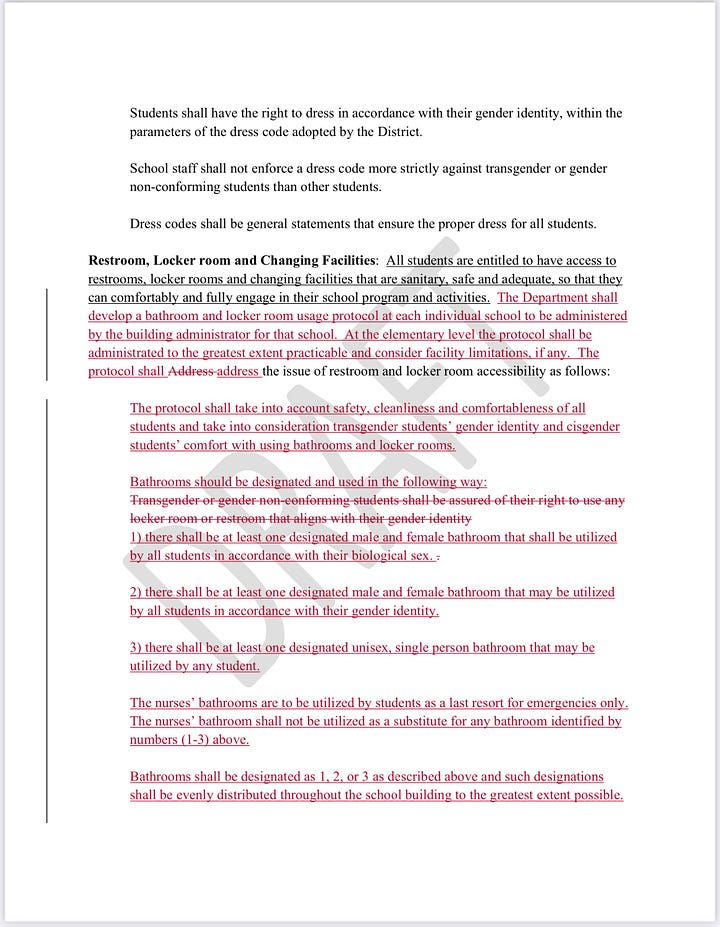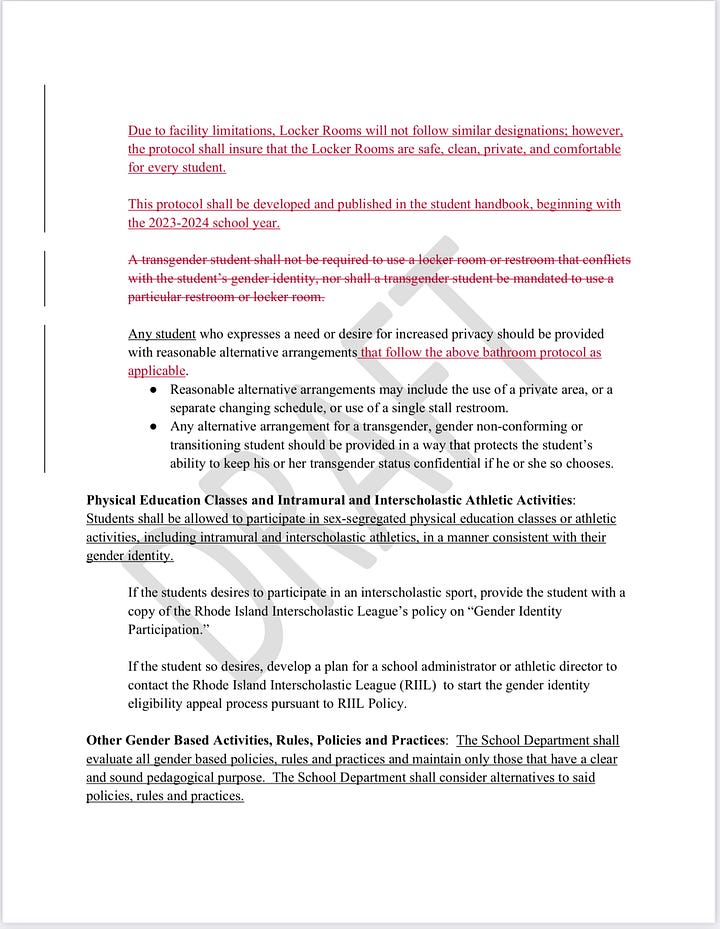Smithfield School Committee approves minor, cosmetic changes to transgender student policy
For now, the issue of changing the policy on transgender, gender non-conforming, and transitioning students in Smithfield is over...
After five meetings and months of testimony from community members, students, educators, attorneys, social workers, healthcare providers, and advocates, the Smithfield School Committee on Wednesday abandoned plans to mandate the outing of transgender students to their parents, "the minute that [a] student asks to use a different bathroom."
Watch the video here:
Instead, the School Committee adopted language into the school system’s policy on Transgender, Gender Nonconforming, and Transitioning Students that will have little impact. It reads:
"As part of the Gender Transition Plan, the school shall put into place measures that will be taken to work with the student to involve their parent/guardian. Such measures shall occur no less than once per month and each measure and occurrence shall be documented and maintained with the Gender Transition Plan. In extreme situations, where the child's safety and wellbeing are determined to be at risk, the administration should address such concerns they would with any other disclosed information regarding the safety of the child."
This language replaces the following language in the policy:
"If the administration determines that notifying the family carries risks for the student, it should work closely with the student to assess the degree to which, if any, the family will be involved in the process and must consider the age, health, well-being and safety of the student."
Also included in the policy is the definition of "cisgender," an artifact of a more comprehensive change to the policy introduced by Committee Chair Richard Iannitelli that were rejected by the Committee.
Chair Iannitelli's proposed language was an attempt to make good on his previously stated opinion that, "the minute that [a] student asks to use a different bathroom" the parents must be informed. The language also sought to shield cisgender students who might be uncomfortable using a public restroom that may potentially be used by a transgender, gender non-conforming, or transitioning peer. You can view the proposed language here:


The language proposed by Chair Iannitelli is almost certainly in violation of Federal and State law, as stated by several attorneys, including Anthony Cottone, Chief Legal Counsel for the Rhode Island Department of Education (RIDE) and Polly Crozier, Director of Family Advocacy at GLBTQ Legal Advocates & Defenders.
Still, to all appearances, the conservative Republican school committee majority seemed poised to enact the changes going into last night’s meeting, but there was a rift in opinion among the School Committee’s Republican majority, and Chair Iannitelli’s focus on bathroom use exposed it.
"Looking through this policy, I honestly don't feel that the bathrooms needed to be changed," said Committee Member Amanda Fafard. "I want every child to feel safe and secure going to the bathroom..." For Fafard, the right to use a restroom in accordance with one’s gender identity is important, as is the accommodation of a cisgender student who might be uncomfortable sharing a restroom with a trans student. [The Transgender, Gender Nonconforming, and Transitioning Students policy already protect the rights of cisgender students who feel this way.]
Committee Vice Chair Jessica Sala said that she thought the language proposed by Chair Iannitelli protected the rights of transgender students to use the restroom that matches their gender identity, but, "it's proposed in such a way, in the drafted policy, that it causes unnecessary stress and anxiety among our students."
Vice Chair Sala proposed an amendment (seen above) that struck out Chair Iannitelli’s language about restrooms, that ultimately passed the committee.
"I am very pleased with your amendment," said Committee Member Benjamin Caisse, one of two Democrats on the Committee. "I can support this."
This last minute change in direction took many people by surprise. Public testimony on the issue was supportive of the “compromise,” but also distraught at the loss of many hours wasted examining and questioning a policy that was not only based on best practices and expert medical opinion, but was actually working to make Smithfield schools safer and more accepting of LGBTQIA+ students.
"I definitely had a bit more to say previous to the amendment," said Smithfield resident Anthony Paiva during public comment. "I'm happy to see the direction this is going. However, I think that the severity of [the proposed change] is why so many people have an issue with it [that] goes beyond bathrooms."
"I have seen firsthand, among families, the rejection of young people who identify as non-binary and transgender, and I've seen young people who are exploring who they are in middle school and in high school and they need to feel safe," said Smithfield resident Colleen Judge, a licensed mental health counsellor. "I believe you have a policy in place that is working well and it doesn't need to be changed - and I'm happy to hear that it may not be changed."
In all, 11 people spoke against changing the policy mandating the outing of trans students to their parents. Only three people spoke in favor of such a proposal.
At the end of the meeting Vice Chair Sala took members of the public opposed to changing the policy and putting transgender youth at risk to task.
"I am deeply concerned with the way that some community members, including, but not limited [to] certain administrators, DEI leaders, and anti-hate group members indirectly threatened and socially bullied school committee members by implicitly attacking their character, careers, and family," said Vice-Chair Sala. "If you want to make Smithfield more inclusive, I suggest you work on your approach on how you make progress with individuals with whom you have different perspectives. While we're in the process of defining words, we may need to look at the definition of the word hypocrisy, which is the practice of claiming to have moral standards and beliefs to which one's own behaviors do not conform. We need to do better than this."
Vice Chair Sala may not like the way the community reacted to the School Committee’s decision to amend the policy on transgender, gender non-conforming, or transitioning students, but in her public statements, she has given voice to alarming ignorance and bigotry.
“I certainly have done my research and Googled plenty,” said Vice-Chair Sala on April 17th. “And what a lot of the results show is that 80 percent of people who transition, under the age of 18, reverse transition in adulthood.” This is verifiably false. In the United States, a National Center for Transgender Equality survey of nearly 28,000 people found that 8% of respondents reported some kind of detransition. Of this 8%, well over half did so temporarily due to societal, financial, or family pressures.
For now, the issue of changing the policy on transgender, gender non-conforming, and transitioning students in Smithfield is over. Polly Crozier, Director of Family Advocacy at GLBTQ Legal Advocates & Defenders, released the following statement:
“In the face of extremist attacks nationwide, there’s never been a more important time to come together to support transgender youth and ensure safety, respect, and inclusion in our schools so transgender students can learn and thrive like every other student. We are pleased that the Smithfield School Committee listened to students, parents, community members, and school staff and maintained a policy that is in line with state Department of Education guidance for ensuring a safe and affirming learning environment for all students, including transgender students.
“Singling out one group of students for unfair treatment, as the proposed policy would have done, sends a terrible message to all students and undermines our public schools’ ability to provide equal educational opportunities for all young people in the community. Ultimately this process reflected how public-school policy should work – as a partnership between parents, students, teachers, and school administrators to arrive at an outcome that meets students’ needs and schools’ responsibilities under state and federal law.”





